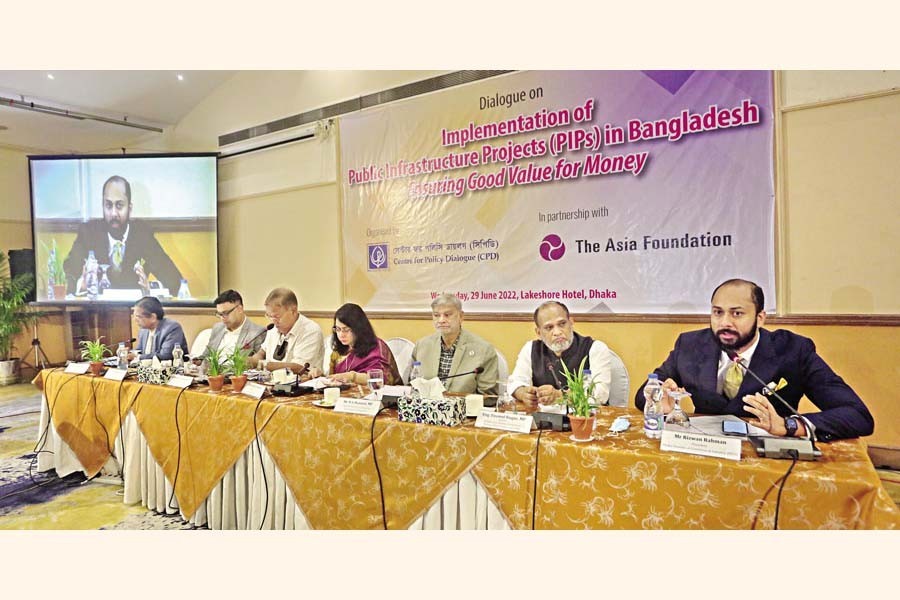Economists at a meet censure cost escalation of development works in Bangladesh for flaws all through and say good value for the public money ought to be ensured in executing infrastructure projects.
Their critical reviews came as faulty project feasibility study, weak planning and absence of post-implementation accountability were listed at the CPD discussion Wednesday, against the backdrop of a slew of megaprojects being executed with such alleged flaws.
Besides, corruption in project implementations and absence of project directors (PDs) from project sites also were mentioned as major obstacles to reaping quality results of the development works.
Such drawbacks undermine desired outcome of many development projects, ultimately resulting in "misuse of public funds", the speakers note.
The dialogue on 'Implementation of Public Infrastructure Projects in Bangladesh: Ensuring Good Value for Money' was organized by the Centre for Policy Dialogue (CPD) in Dhaka, incidentally a day before public accounts of spending for the outgoing fiscal closes today and new budget gets through parliament.
Attending the dialogue from government side, Planning Minister MA Mannan mentioned the absence of PDs from project sites as a big headache for the government now.
"The PDs are the very important persons for the projects. But many of them are not staying on the project site. It's a national problem for the country now," he said.
"Frankly speaking, many civil servants do not want to stay at their workstations in upazila and district levels. They prefer staying in Dhaka. The government is not being able to ensure their cent-percent presence in the working stations yet," the minister told his audience.
Presided over by CPD Executive Director Dr Fahmida Khatun, the meet was also attended by Chairman of the Parliamentary Standing Committee on Estimates Vice-Principal Dr Md Abdus Shahid MP, Member of the Parliamentary Standing Committee on the Ministry of Road Transport and Bridges Engr Enamul Haque MP, President of Dhaka Chamber of Commerce and Industry (DCCI) Rizwan Rahman and Chairman of Policy Exchange of Bangladesh Dr M Masrur Reaz.
CPD distinguished fellow Prof Mustafizur Rahman presented a keynote at the discussion meeting.
Mr Abdus Shahid said it is true that there are some misappropriations of public funds in project implementation. "Although we do not want to tell it as stealing, but the time and cost overruns are obstructing the value of public money and getting desired outcomes."
He adds: "As parliamentary standing committee chairman on estimates I have found that many PDs purchase jeeps for them and some others cars just after starting the project. But they cannot start the actual project works in months. Sometimes, I ask them whether they have the government cars. They replied that they need the jeep for monitoring the projects although they had another car!
"But I ask them to take fuel bill from government rather than purchasing a costly jeep in addition to his government-provided car for him. But it is not happening. The project implementation may be in bad shape but they performed better in car purchase, which component is incorporated in the project proposal."
The chief of the parliamentary watchdog body feels the urgency of checking time and cost overruns of the projects.
"Without ensuring the project implementation in time with quality, our goal to become a developed nation will be difficult to achieve," he told the meet.
Another government party lawmaker, Engr Enamul Haque, points out problems in feasibility study and project planning, and suggests remedying the ills.
"We have to monitor the pre-implementation, implementation and post-implementation periods of the projects strictly for ensuring quality outcome," he told the function.
"If we build a good health-complex building in an upazila without ensuring adequate doctors, nurses, apparatuses and better services, the desired outcomes will not be achieved," says Engr Enamul to explain the paradox in development pursuit.
He strongly criticised undertaking ad-hoc basis projects instead of a long-term "structural plan" and its true implementation.
Mr Enamul suggests forming a panel of PDs for appointing proper persons for specific projects.
Planning Minister Mannan further mentioned that some existing laws and rules do not fit in the present context. Those British-or Pakistan-period laws and rules are sometimes creating obstacles on the way to development and transparency of the government.
"For example, if you want information from government bureaucrats, it will take 90 days to give you that as the rules allow them the long period. Perhaps, they can give you the information in 90 seconds, but they will take 90 days--even they can take more than that using some gaps of the rules and regulations," he said.
About the discussion on the strengthening of the Implementation Monitoring and Evaluation Division (IMED), the minister said bureaucratic tangles are affecting the reform of the IMED.
Mr Mannan said they are working for the people to ensure a better service. "The Sheikh Hasina-led government is very much proactive to the development of the country, for its people."
Business leader Rizwan Rahman feels that only budget expenditure is not enough but it is imperative to ensure the quality implementation and its proper outcomes.
The DCCI president suggests engaging citizens with the development project to achieve a better result.
"The contractors who fail to complete a project work properly can get even bigger project tender later. How it is possible!" he wondered, putting emphasis on proper government monitoring for ensuring the value of money in the development projects.
Mr Rahman also emphasized ensuring better public-private-partnership projects for the development of the country overcoming the coordination problem between the PPP Authority and the line ministries.
Dr Masrur Reaz said it is imperative to ensure good governance in project implementation to enhance capacity in a bid to become an upper-middle-income country.
Prof Mustafizur in his presentation said faulty feasibility, absence of quality implementation, and lack of post-implementation review of the development projects are hampering quality outcome of the development works.


